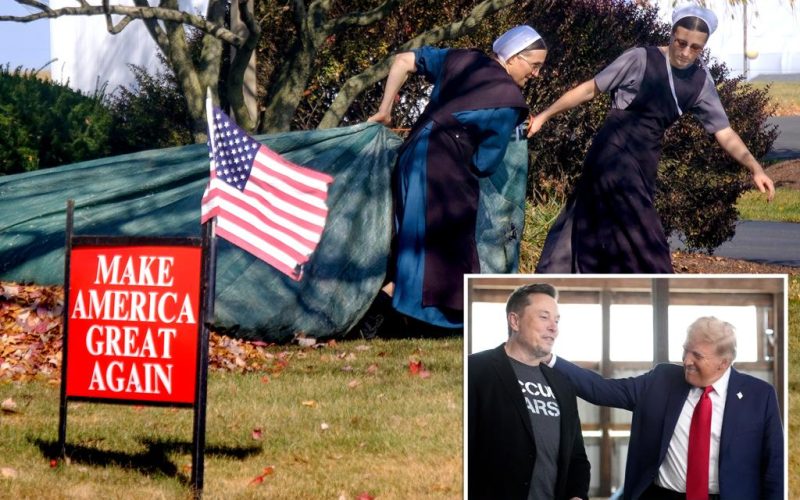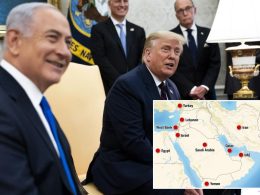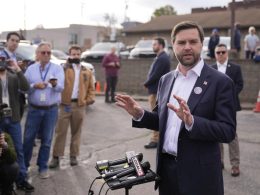LANCASTER COUNTY, Pa. — About 100 miles west of Washington DC, at the nexus of quiet country roads, sits a network of bustling small businesses and community connections that helped deliver the swing state of Pennsylvania for President-elect Donald Trump.
For nearly a decade, with the smells of fresh manure and homemade shoofly pie in their nostrils, GOP operatives have worked diligently to register an under-courted voting bloc — the Amish.
Despite their efforts, attendance at the polls was long lagging, for a reason that escaped outsiders but was obvious to locals: Election Day falls on a Tuesday — but for many Amish, so does wedding day.
The deeply religious and rural group traditionally only holds marriage ceremonies on Tuesdays and Thursdays in the fall — just as harvest season kicks off.
So this year, a group of local Republicans came together to finish the work national Republicans started, by offering car rides directly to the polls from Amish weddings.
“This was a missionary effort to reach an unreached people,” organizer Liesa Burwell-Perry, an avid churchgoer and a teacher’s wife, told The Post. “This is about neighbors helping neighbors.”
By Burwell-Perry’s count, 200 community members shuttled about 26,000 people from Amish weddings to the polls to vote for Trump on Election Day — one of the highest turnouts the region has seen in recent history.
‘Operation Help Thy Neighbor’
The effort kicked off days before Election Day, when Burwell-Perry took, in her words, “17 seconds” to whip up a flyer with phone numbers to call for free rides to the polls, launching what she called “Operation Help Thy Neighbor” from her Bainbridge church basement.
A longtime non-Amish area resident, Burwell-Perry knew that Amish weddings typically last from dawn to dusk, with a brief break between church services — offering just a short window of opportunity for wedding guests to get to the polls.
But the time-consuming nature of transportation by horse-drawn carriage made even that challenging to accomplish.
With this knowledge — and “a lot of prayer” — Burwell-Perry said she spent her November mortgage payment printing out 10,000 copies of her flier and paying locals to drop them off at farms and slip them into buggies parked across the southern Pennsylvania counties home to the majority of the state’s Amish.
Elon Musk’s America PAC later pledged to reimburse Burwell-Perry, and rented her little-operation-that-could about 30 computers and a Starlink device so she and her fellow local activists could run a call center from a church basement.
By the morning of Nov. 5, the organizer had gathered and vetted 200 drivers to offer rides and dozens of phone bank workers to take calls. But first, Burwell-Perry had to find the weddings.
Like Amish church services, Amish weddings are often held in farmhouses, the locations of which are kept tightly secret — with fathers of the brides usually announcing their daughters’ wedding details only by word-of-mouth in church.
With the help of some Amish neighbors, Burwell-Perry learned of just a handful of weddings happening on Election Day.
She then tapped Lancaster County residents Brenda Biesecker Clair and Joe Goody to act as scouts Tuesday morning, looking for Amish families heading to local farms in their Sunday best — a dead giveaway they were headed to a marriage ceremony.
When the pair would find a wedding, they’d offer rides and call in the address to Burwell-Perry, whose team — which included some Mennonite and Amish volunteers — would dispatch additional drivers to the locations.
Biesecker Clair called what she saw “a modern-day miracle.”
“If a load [of Amish] got out of my car at a wedding, they would be like, ‘Can you wait here a minute?’ and they would say, ‘I’m gonna go tell my brother,’” she said. “And then the brother would come out with his wife and her sister and husband.”
“And it just went on like that all day.”
Amish-Republican crossover
So what would a group so devoted to humility that they don’t even put faces on their daughter’s baby dolls have in common with a former reality TV star and real estate mogul ex-president?
According to dozens of Amish, Mennonite, and ex-Amish who spoke with The Post this week, many of the groups’ deepest-held beliefs — including limited government and freedom of religion, went hand-in-hand with Republican campaign platforms.
For John Henry Smucker, 28, it was Trump’s anti-establishment beliefs that resonated. Growing up on an Amish dairy farm, he saw his family repeatedly raided by Food and Drug Administration (FDA) investigators searching for raw milk products.
“My dad was a farmer who sold all his own products from the farm, so we made cottage cheese, ice cream, yogurt, and we sold raw milk,” he told The Post. “And so I experienced the government overreach myself. We would get raided. We never got stuff taken out, but we would get threats.
“I’d see this stuff going on and I said, you know, a responsible American citizen should know if they want to drink raw milk or not. You know, they put so many pesticides and you know, poison into our food, and they want to tell me that this stuff that’s good for us is illegal? So, yeah, so that was a big deal to me growing up, and it did shape my leanings my conservative.”
That same issue riled Lancaster County Amish this past January, when one of the area’s largest local farm shops — Amos Miller Organic Farm — was targeted by the FDA. Investigators confiscated thousands of dollars worth of raw milk and other products Miller sold for a living, such as granola.
The Amos Miller incident had a galvanizing effect on many Amish, who said they had enough of the overreach.
“You’ll hear people say a lot that they ‘vote with their knees,’” one Amish woman who asked not to be named told The Post. “They don’t want to be involved with the government and just want to be left alone.
“But now, the government has come for us.”
Smucker agreed, saying: “If these groups wish to keep the freedom they have to gather in places, not in secret, and continue to live their Christian freedoms, they have to voice their opinion and their beliefs in not only elections, or not only in federal elections, but especially local elections.”
Musk acknowledged the sentiment in an interview with conservative commentator Tucker Carlson last week.
“The Democrats did make a mistake because there was government overreach … that shut down some Amish farmers, which really made them upset,” the Tesla, X and SpaceX boss said. “And you just need to be able to channel that, the fact that they’re upset, like, ‘Well, there’s a thing you can do about it, which is called voting, and we’re happy to transport.’”
Other issues that resonated with would-be Amish voters included abortion restrictions and the prevalence of gender transition surgery on children.
So when Burwell-Perry’s volunteers showed up, they found an enthusiastic audience.
“It was like shooting fish in a barrel,” said volunteer Levi King, who was raised Amish but left the church in adulthood. “So many wanted to vote.”
“Voting is the one thing you can do to preserve this way of life.”
By the numbers
There are just over 90,000 Amish in Pennsylvania — about half of whom are eligible to vote, according to the Young Center for Anabaptist and Pietist Studies at Elizabethtown College.
However, pre-2024 estimates had indicated that only roughly 10% of the religious group went to the polls.
National Republican organizers were aware of the potential well of support, but their lack of understanding of the community hampered their efforts.
“In 2016 and 2020, local party activists who registered Amish voters made claims that turned out to be much greater than the reality turned out to be,” Elizabethtown professor of history and Anabaptist studies Steven Nolt told The Post.
Trump himself got caught in the same trap when he held a rally in Lancaster County Nov. 3.
When the Republican nominee noted that he did not see any Amish in attendance, the crowd chanted back: “It’s Sunday! They’re at church!”
The Amish alone did not give Trump Pennsylvania’s 19 electoral votes. With 99% of the votes counted as of Monday evening, the Republican nominee led Vice President Kamala Harris by just over 144,000 votes.
“For one thing, the entire Amish adult population in York, Dauphin and Lebanon counties combined is only about 1,300 people,” Nolt said. “And even if 100% of Lancaster’s eligible voters were registered and had a 100% turn-out rate, that would only be about 18,000 [Amish.]”
While tallying each Amish vote is a painstaking process that Nolt said will take months to years to complete, the raw data from Amish-heavy, rural Pennsylvania counties shows marked improvement in voter turnout, according to an analysis by The Post.
Statewide, there were roughly 40,000 fewer ballots cast in 2024 than in 2020. But in Lancaster, Chester, Lebanon, Dauphin and York counties, the vote count increased by 27,080 ballots — about 2.56% of the region’s 1,083,531 total votes tallied.
Broken down, there were 10,048 more ballots cast in Chester County; 1,185 more in Lebanon County; 313 more in Dauphin; 8,729 more in Lancaster County and 6,805 more in York County, according to official Pennsylvania election data.
Local activists say the rural vote increase should not be discounted. On Monday, Burwell-Perry was already knocking doors and visiting area barns to register even more Amish to participate in the next election.
“The Amish have shown up,” Biesecker Clair said, “and when they do, you know it’s serious.”








